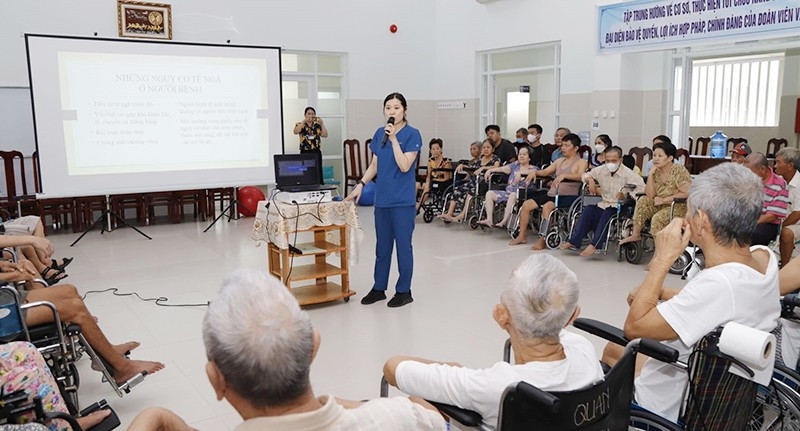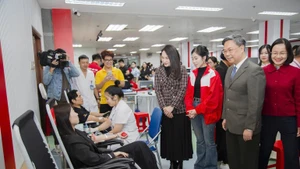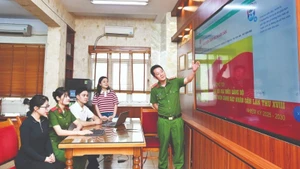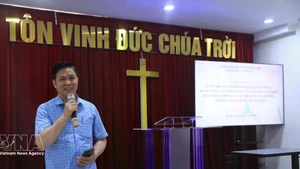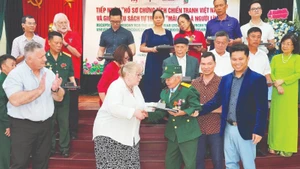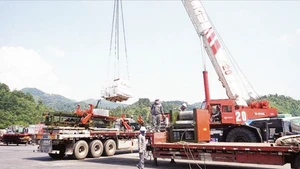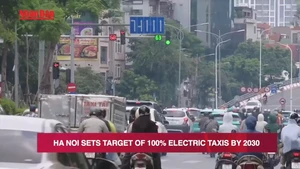These achievements reflect Vietnam's strong political commitments to the international community in its efforts to overcome the challenges faced by a developing nation to best ensure the rights of people with disabilities.
The CRPD, adopted in 2006 and effective from 2008, is an important international legal instrument aimed at promoting, protecting and ensuring the rights of people with disabilities globally.
Vietnam signed the CRPD in 2007 and had it ratified by the National Assembly in 2014. Since then, Vietnam has consistently demonstrated its commitment and responsibility towards ensuring and implementing the rights of people with disabilities. Currently Vietnam has about 7 million people with disabilities, accounting for 7.06% of the population.
In 2010, Vietnam enacted the Law on Persons with Disabilities, marking a shift from a charity-based approach to a human rights-based approach, viewing people with disabilities as subjects with equal rights, rather than merely as objects requiring assistance. The law defines the rights of people with disabilities in fundamental areas such as healthcare, education, employment, infrastructure accessibility, and social protection, while also prohibiting discrimination and prejudice.
The 2013 Constitution also affirms the principles of equality and non-discrimination, creating a solid legal foundation for protecting the rights of people with disabilities. Numerous legal documents such as the Labour Code, Education Law, and Construction Law have been issued with specific policies supporting people with disabilities.
After ratifying the CRPD, Vietnam has strived to improve its legal framework in accordance with the convention, affirming its responsibility to international commitments. Notably, the prime minister's Decision No. 1100/QD-TTg in 2016 approved the implementation plan for the CRPD, with a focus on 10 main contents including changing community perceptions and improving access to public services.
Similarly, Decree No. 28/2012/ND-CP and Decree No. 136/2013/ND-CP have provided detailed guidance on implementing the Law on Persons with Disabilities in practice, including social assistance policies and determining disability levels. Additionally, the establishment of the National Committee on People with Disabilities in 2015 was an important step in coordinating and monitoring CRPD implementation in Vietnam.
Notably, raising community awareness, an important requirement mentioned in Article 8 of the CRPD, has been effectively implemented by Vietnam through diverse communication campaigns, contributing to increased awareness and changing social attitudes towards respecting and ensuring the rights of people with disabilities.
Events such as Vietnam Day of Persons with Disability (April 18) and International Day of Persons with Disabilities (December 3) are organised annually, with various activities such as cultural exchanges, legal knowledge competitions, and recognition of exemplary individuals, thus contributing to raising community awareness about people with disabilities. Additionally, the Fatherland Front and organisations of/for people with disabilities actively participate in policy review and monitoring, ensuring the voices of people with disabilities are heard.
Vietnam plays an active role in international cooperation on the rights of people with disabilities through participation in regional and global forums, particularly with many initiatives in developing and implementing regional action plans on human rights, promoting and protecting the rights of people with disabilities.
Within ASEAN, Vietnam has contributed to developing the Bali Declaration and the Framework of the ASEAN Decade of Action for Persons with Disabilities (2011-2020). The action framework aims to promote the inclusion of people with disabilities in the region by enhancing access to education, employment and healthcare services, and ensuring full participation in social life, thereby building a barrier-free and equitable ASEAN community.
With these achievements, Vietnam has been recognised by the international community as a bright spot in poverty reduction and achievement of sustainable development goals. Additionally, the social security system has continuously expanded coverage and improved policy quality for people with disabilities. More than 1.6 million severely disabled people receive monthly social allowances; 96% of people with disabilities have health insurance cards; all central, provincial and district general hospitals have rehabilitation departments; and children with disabilities receive support for inclusive education at educational institutions.
Recently, a delegation led by Deputy Minister of Home Affairs Nguyen Van Hoi attended a session for defending reports on the implementation of the CRPD at the UN headquarters in Geneva. Reporting at the session, Hoi reaffirmed the Vietnamese Party and State’s determination to care for and facilitate people with disabilities in equally exercising their political, economic, cultural and social rights and developing their potential to stabilise their lives and integrate into the community, in accordance with the CRPD, to which Vietnam is a member.
Although Vietnam has achieved many notable accomplishments in ensuring the rights of people with disabilities, it still faces numerous challenges.
Firstly, in rural areas, where most people with disabilities live, access to basic services such as healthcare, education and employment remains limited. Therefore, despite 96% of people with disabilities having health insurance cards, in many remote areas, lack of facilities and human resources makes it difficult for many people to receive actual benefits from this policy.
Moreover, the proportion of people with disabilities in rural areas receiving vocational training support is not high, indicating that there is still a gap in implementing skills development programmes for this group.
Secondly, with the limited economic resources of a developing country, Vietnam faces difficulties in investing in infrastructure friendly to people with disabilities. As of 2024, only 3.5% of public buses and 30% of bus stations have accessibility infrastructure, while the proportion of public buildings with accessibility support remains low. This creates obstacles for people with disabilities to fully participate in social life, especially in urban areas.
Thirdly, although awareness-raising campaigns have achieved many results, social prejudice against people with disabilities still exists in the mindset of some people. There are still views that people with disabilities are objects requiring assistance rather than individuals with equal rights, leading to discrimination in the community, causing harm to those unfortunate enough to have physical impairments. For example, in some localities, children with disabilities are still restricted from participating in inclusive education due to apprehension from parents or teachers.
Exploiting these limitations, hostile forces strive to distort and falsely accuse Vietnam of being "indifferent" and "neglecting" people with disabilities, aiming to undermine public trust in the Party and State, and diminish Vietnam's reputation internationally. These subversive elements deliberately ignore the fact that resource limitations, which are common in developing countries, have been gradually addressed by Vietnam, with more than 1.6 million severely disabled people receiving monthly allowances, and 96% of people with disabilities having been issued health insurance cards.
In fact, compared to many countries with similar income levels, Vietnam has made significant progress in supporting people with disabilities. For instance, in the Philippines, although the law on persons with disabilities has been enacted, the country still faces major challenges in practical implementation due to lack of systematic data and geographical fragmentation across its more than 7,000 islands. Meanwhile, Vietnam has built a coherent legal framework and monitoring network extending to 38 out of 63 provinces and centrally governed cities as of 2024.
Vietnam's achievements in implementing the CRPD are the clearest evidence of a developing country's efforts to balance economic growth with ensuring human rights. In the coming time, to better ensure the rights of people with disabilities, Vietnam needs to focus on several key solutions.
First, Vietnam needs to strengthen the implementation and monitoring of policies for people with disabilities, enhance the role of the National Committee on People with Disabilities in monitoring and supporting localities, while establishing strict penalty mechanisms for violations of the rights of people with disabilities.
Vietnam should invest in infrastructure in remote areas, while training rehabilitation specialists and social workers for people with disabilities.
It is also necessary to continue to promote the participation of people with disabilities in social activities, creating conditions for them to directly participate in policymaking and elections by improving information and physical support; and enhance social awareness by promoting community education through diverse forms suitable for various audiences.
Additionally, Vietnam needs to focus on effectively utilising social media platforms to promote awareness to help eliminate prejudice existing among some segments of the population towards people with disabilities, along with encouraging and promoting the inclusion of people with disabilities in all fields.
With proper policies, determination, and the unity of the entire political system, Vietnam will advance further on its journey to build an inclusive, fair and humane society, where people with disabilities are respected and provided with conditions for comprehensive development, and no person with a disability is left behind in the country's socio-economic development process.
